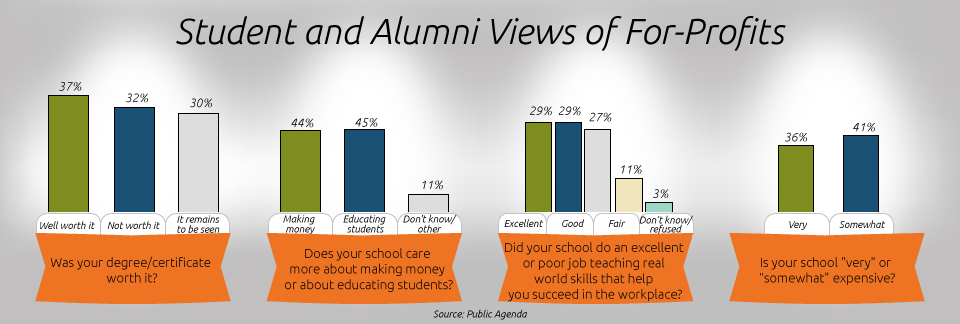You have /5 articles left.
Sign up for a free account or log in.
The extensive marketing that some for-profit colleges use to woo prospective students and the intense criticism voiced by some Democratic politicians have largely dominated the national discussion about the college sector. A new survey from Public Agenda seeks to insert a set of missing voices into the dialogue -- those of students and alumni -- and their assessment is mixed.
Over all, the survey found, for-profit-college students are satisfied with their experience, reporting effective guidance from counselors, caring instructors and small class sizes. But the high cost of attending the institutions concerns many of them, and nearly a third of the alumni said their degree just “wasn’t worth it.” Thirty-seven percent said their degree was “well worth it;” the rest said it “remains to be seen.”
“The for-profit sector warrants scrutiny, particularly on questions of cost and student recruitment, but it's also clear that these colleges are responding skillfully to the needs of a significant number of America’s students," said Will Friedman, president of Public Agenda in a press release.
Officials at for-profit colleges question the survey’s legitimacy, noting that it is based on the views of just 197 students and 249 alumni.
“I think we are still a long way off from data that would help us draw better conclusions,” said Noah Black, a spokesman for the Association of Private Sector Colleges and Universities.
The lead researcher, Carolin Hagelskamp, said the sample sizes are small because the study utilized a set of “state-of-the-art sampling and weighting methodologies” that are very expensive.
“A study of this kind (which uses sophisticated methodologies to collect representative data from low-incidence groups such as for-profit students) requires a lot of time and resources. This is why our samples are comparative small. I assume that this is also a reason for why such studies are rare,” she said in an email.
The Findings
Current students and alumni alike had generally positive things to say about their experience at for-profit colleges, the study found. Overwhelming majorities of current students praised the guidance they received (91 percent) and small class sizes (85 percent) and were optimistic that their credentials would help them find good jobs. About two-thirds, though, said they consider the colleges to be “expensive” and 47 percent said they worry “a lot” about taking on too much debt.
Alumni gave comparably high marks on their experiences while in school, but the fact that just 37 percent said their degree was worth the price troubled researchers.
Public Agenda said a companion study of community college students found that about a third of them worried about taking on too much debt. But the study did not ask community college graduates a parallel question about whether their education was worth it.
The researchers said they were troubled by the fact that barely a third of for-profit alumni described their degrees as having been worth the price. They acknowledged that the alumni were contacted during a tough economy, and that alumni who are working are twice as likely to say their degree was worth it than are those who are unemployed.
"Nevertheless, it is certainly the case in this study that many graduates from for-profit schools put some blame on their schools for not adequately preparing them for the job market," said Hagelskamp.
The study also noted that undergraduates at for-profit colleges generally “aren’t comparative shoppers,” many considering only one institution before enrolling and few comparing for-profit colleges to nonprofit ones.
Like Black of the for-profit-college association, Wally Boston, CEO of American Public University System, said he found it "interesting" that the study used the impressions of 197 students and 249 alumni to reflect the views of the sector's millions of current and former students.
He also said the university's own data suggest that “since the recession," online students like his "are looking at three or four institutions before they make up their mind,” he said.
Andrew Kelly is director of the Center on Higher Education Reform and a resident scholar in education policy studies at American Enterprise Institute. He said he applauds the Public Agenda researchers for introducing a perspective that hasn’t really been shown.
“I think this is one of the first times we’ve heard this voice, the consumers’ voice here,” he said.
“What we often hear in this debate are complaints from people who are dissatisfied so those are the people you often see testifying in front of Congress, talking about a student who has taken on an excessive amount of debt, dissatisfied with their program," Kelly said. "That’s understandable but I think this is an interesting, more holistic picture of how people feel.”









